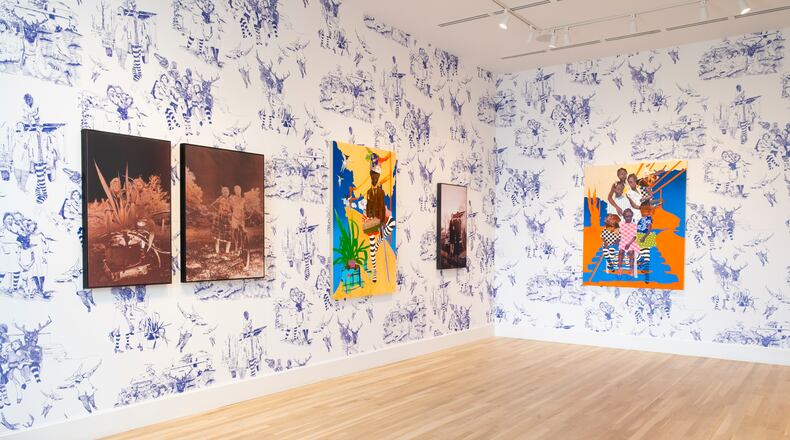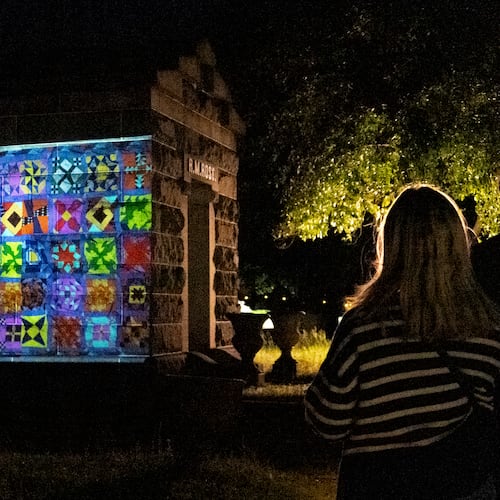This story was originally published by ArtsATL.
Repetition is a guiding principle for much of Shanequa Gay’s work that creates patterns with repeated images — such as her signature indigo toile schema.
In ”Gateway to the South” at Jackson Fine Art, Gay reclaims the toile de Jouy, once a symbol of American colonialism. Her indigo patterns — installed as wallpaper in the space — sprawl behind large works of a world captured by the lens of her great-grandfather James “Papa Jim” Battle, a second-generation railroad worker. Her works collapse, re-create and transform his photographs of everyday life in Dallas, Georgia, in the 1920s and 1930s.
The exhibition also features the toile pattern on sets of white plates and pieces of her great-grandmother’s handcrafted legacy transferred onto chiffon in “mama stella’s quarter.”
Credit: Courtesy of Jackson Fine Art
Credit: Courtesy of Jackson Fine Art
In “standing on business,” a mixed-media piece on wood, a bronze-skinned Black man looks forward from a stark blue and gold landscape. A cane holds him up as he perches on one black-and-white striped leg. A collaged bull crown adorns his head, matching the bull head of female figures gliding through the sky behind him.
With pink plaid, royal blue, neon orange and other vivid patterns leaping from behind well-dressed subjects in her works, many blending human and animal forms, Gay awakens the Silent Generation with joy and play, a contrast to their tendency toward seriousness in pictures.
Surrounding the wood panels are sepia-toned reprints of Battle’s photographs on aluminum. Gay says she treasures the snapshots of one of Georgia’s oldest Black communities.
“We didn’t always have access to who we were,” says the Atlanta artist whose work represents memory and myth in Black culture.
“This was a time before integration, so it’s an untethered, unbothered space and, by and large, a kind of mythological space. A space where there was all-Black ownership, all Black education. A space that was a bit uninterrupted” — similar to the Atlanta she knew growing up, Gay says.
Credit: Courtesy of Jackson Fine Art
Credit: Courtesy of Jackson Fine Art
The aluminum prints, while less playful, are just as compelling. One wonders about the lives and loves of those pictured: arm-in-arm couples in three-piece suits and gold-tipped shoes; twin sisters in matching skirts standing on a train track; and little girls in dresses taking a break from their bike ride. Some of the photos are of Gay’s fictive kin — “play cousins” — and relatives, including great aunts and her great-great-grandfather, who is pictured among a group of railroad workers on the job in “only a few are invited to toil here.”
Some of the works are also in adoration of the women in Gay’s life who taught her most about God, she says, such as “trinity,” a trio of leisurely women enjoying a day out.
Attire is a constant in the photos. It is tailored and fashionable. It’s a demonstration of the Black cultural penchant for personal style, no matter the setting or the circumstances.
“These images say we don’t have to be in the background; that we are not in a place of service to others — we’re in a place of service to ourselves,” Gay says. “We have ownership, we have space, we have land and we have time to be at peace.”
Battle’s photographs have been muses for Gay’s work before. And she was fascinated to learn more about the town where her mother was raised, where her proud people came from, she says.
Credit: Courtesy of Jackson Fine Art
Credit: Courtesy of Jackson Fine Art
In the present commuter culture, Dallas, Georgia, is a stretch of interstate northwest from Atlanta, less than hour away. Part of her fascination was seeing the repetition of “Atlanta, Georgia, Gateway to the South” in the photos, like on the car tag of one of the couples pictured.
Her parents landed here, so Gay hails from the Stewart Avenue (now Metropolitan Parkway) community of years past.
Several previous exhibitions embodied her love for the city, such as Jackson Fine Art’s ”The Beautiful Tale of Atlannahland” in 2021, and ”Lit Without Sherman: A Love Letter to the West End” at Hammonds House in 2019.
“I think about the ways in which other cities are able to tout their importance and how wonderful they are, but, if you’re from the South and then specifically from Atlanta or Georgia, some people play it off as a joke,” Gay says. “But Atlanta is a trailblazer — I’ve only known Black ownership and Black leadership. The whole world’s eyes have a tendency to be on us.”
Although brutally shaped by racism and classism, Atlanta has long been a gateway as a transportation hub, from its roots as Terminus in 1837 (when its railroads connected the Midwest to the East Coast) to being the home of Hartsfield-Jackson, the world’s busiest airport.
Credit: Courtesy of Jackson Fine Art
Credit: Courtesy of Jackson Fine Art
But for many Black folks, it has also been the gateway to a thriving life. That passage is rife with complications — continued racism, a wide income gap, failures in Black figurehead leadership, perpetual neglect of communities south of Downtown -- but the city remains a cultural, political and industry leader in many ways.
It’s a testament to the buoyancy and resourcefulness of those communities, and a callback to communities such as Dallas and other Black Southern towns whose descendants carried their legacies to cities like Atlanta.
“I’m proud of my city. I’m proud of the space where I’m from. And the South is a really beautiful place that isn’t only about slavery,” she says. “The South to me is sweetness. It is about slowness. You have to be patient; you have to take your time. And if we think about things in nature that move at a slow, consistent pace, they live the longest.”
ON VIEW
“Gateway to the South”
Through June 29. Jackson Fine Art, 10 a.m.-5 p.m. Tuesday-Saturday. 3122 E. Shadowlawn Ave. NE, Atlanta. 404-233-3739, www.jacksonfineart.com.
::
Angela Oliver is a proud native of old Atlanta who grew up in the West End. A Western Kentucky University journalism and Black studies grad, daily news survivor and member of Delta Sigma Theta, she works in the grassroots nonprofit world while daydreaming about seeing her scripts come alive on the big screen.
Credit: ArtsATL
Credit: ArtsATL
MEET OUR PARTNER
ArtsATL (artsatl.org) is a nonprofit organization that plays a critical role in educating and informing audiences about metro Atlanta’s arts and culture. ArtsATL, founded in 2009, helps build a sustainable arts community contributing to the economic and cultural health of the city.
If you have any questions about this partnership or others, please contact Senior Manager of Partnerships Nicole Williams at nicole.williams@ajc.com.
About the Author
Keep Reading
The Latest
Featured







